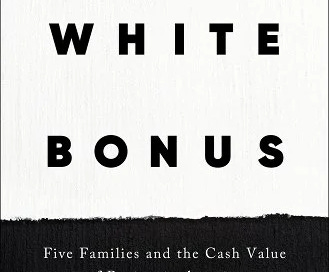Review: The White Bonus by Tracie McMillan
When you know what you're about to read & it's satisfying anyway
For a lot of reasons, it took me a good long while to get through Tracie McMillan’s important treatise, The White Bonus: Five Families and the Cash Value of Racism in America.
Maybe the most important one is that I have told myself a story about slowing down on reading nonfiction while I work on my next book. I don’t think this story is true for a lot of reasons: I enjoyed this Ta-Nehisi Coates Vanity Fair piece promoting his forthcoming book, The Message, and I am still making my way through Kidada E. Williams’ I Saw Death Coming, along with a couple of other very compelling reads. It’s probably more accurate to say that I didn’t want to read McMillan’s book because I tire of being reminded of the advantages that white people have that they never think about, regardless of their class, and usually not until another white person has reminded them. Even this is a complicated statement that is also not entirely true. To paraphrase the great James Baldwin, in this case, I am writing to discover what I think I know.
In The White Bonus, McMillan, a journalist with a compelling family history that underscores the main point of the book turns the lens on herself as a prime example of someone whose trajectory would be totally different were she not the beneficiary of the privileges enabled by her whiteness and that of her family. She then extends her purview to a few other families, making the point throughout that the ways that we discuss racism in America would be more accurate if we were to point out not just what racism takes from Black people, but the value that it provides by way of generational wealth, privilege and access to benefits for white people above all else.
This is a sharp contrast to popular discussions of racism in America, where the zero sum mentality interrupts common grounds for solidarity across race at every turn. What a perfect line Michelle Obama just uttered when she said that many of us will never “benefit from the affirmative action of generational wealth.” Not only that, we code switch our way out of confronting the truth about how the advantages of whiteness quietly and loudly perpetuate racism indefinitely and without dispute.
There is something about the way that McMillan tells the story of her family that is misaligned with the title that I also can’t put my finger on. It may be that she admittedly doesn’t have a ton of money and she’s satisfied with the life she’s led, but her parents — particularly her father — did have some, and having access to that, even if she did have to put her pride aside to accept it, is just one of the many white bonuses she has been afforded that a Black woman would never be presented with. Ultimately, the book gave me a lot to think about as a writer, especially when it comes to reframing stories of racial privilege and advantages not according to the barriers Black people face but all the reasons whiteness has to keep those barriers in place for anyone who is not white in America.




